Trigonometric equations. Main methods for solving
Methods of solving: algebraic method, factoring, reducing
to a homogeneous equation, transition to a half-angle,
introducing an auxiliary angle, transforming a product to
a sum, universal substitution.
Trigonometric equations. An equation, containing an unknown under the trigonometric function sign is called trigonometric .
Simplest trigonometric equations.
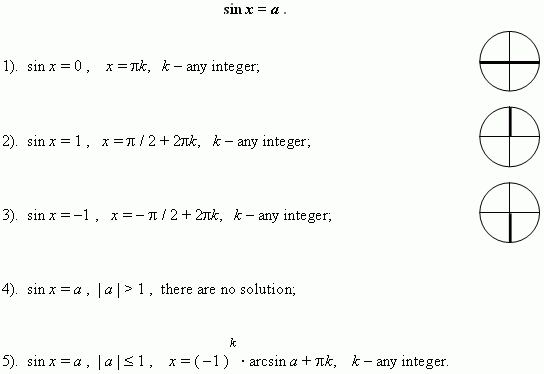
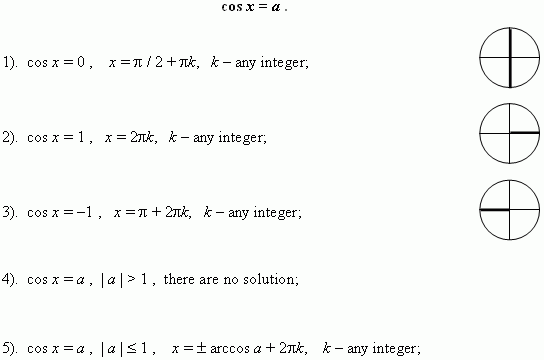
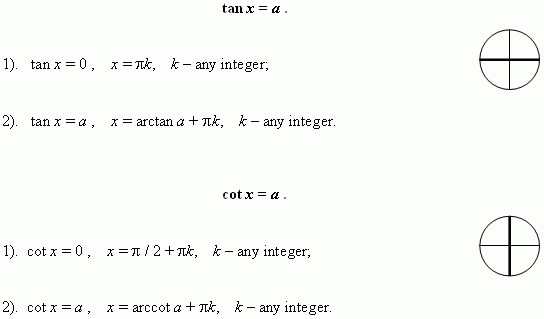
Methods for solving trigonometric equations. Solving of a trigonometric equation consists of the two stages: transforming of a equation to receive its simplest shape ( see above ) and solving of the received simplest trigonometric equation. There are seven main methods of solution of trigonometric equations.
1. Algebraic method.
This method is well known for us from algebra ( exchange and
substitution method ).
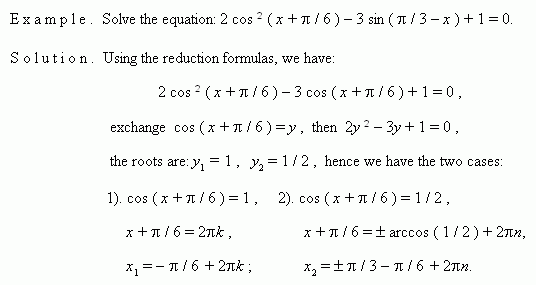
2. Factoring. Consider this method by examples.
E x a m p l e 1. Solve the equation: sin x + cos x = 1 .
S o l u t i o n . Transfer all terms to the left:
transform and factor the left-hand side expression:
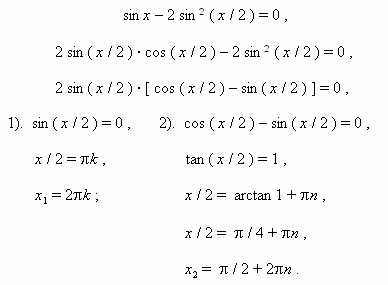
E x a m p l e 2. Solve the equation: cos ² x + sin x · cos x = 1.
S o l u t i o n . cos ² x + sin x · cos x – sin ² x – cos ² x = 0 ,
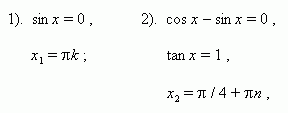
E x a m p l e 3. Solve the equation: cos 2 x – cos 8 x + cos 6 x = 1.
S o l u t i o n . cos 2 x + cos 6 x = 1 + cos 8 x ,
2 cos 4 x cos 2 x = 2 cos ² 4 x ,
cos 4 x · ( cos 2 x – cos 4 x ) = 0 ,
cos 4 x · 2 sin 3 x · sin x = 0 ,
1). cos 4 x = 0 , 2). sin 3 x = 0 , 3). sin x = 0 ,

| 3. |
Reducing to a homogeneous equation.
An equation is called a
homogeneous
equation
in
sin
and
cos
, if and only if all its terms are of the same degree in
sin
and
cos
of the same angle.
To solve the homogeneous equation it is necessary: a ) to transfer all terms to the left-hand side; b ) to take all common factors out of brackets; c ) to equate all factors and brackets to zero; d ) the brackets equated to zero give the homogeneous equation of the smaller degree, which should be divided by cos ( or sin ) of the higher power; e ) to solve the received algebraic equation in tan . |
E x a m p l e . Solve the equation: 3 sin ² x + 4 sin x · cos x + 5 cos ² x = 2.
S o l u t i o n . 3 sin ² x + 4 sin x · cos x + 5 cos ² x = 2sin ² x + 2cos ² x ,
sin ² x + 4 sin x · cos x + 3 cos ² x = 0 ,
tan ² x + 4 tan x + 3 = 0 , hence y ² + 4 y +3 = 0 ,
the roots of this equation are: y 1 = –1 , y 2 = –3 , from here
1) tan x = –1, 2) tan x = –3,
![]()